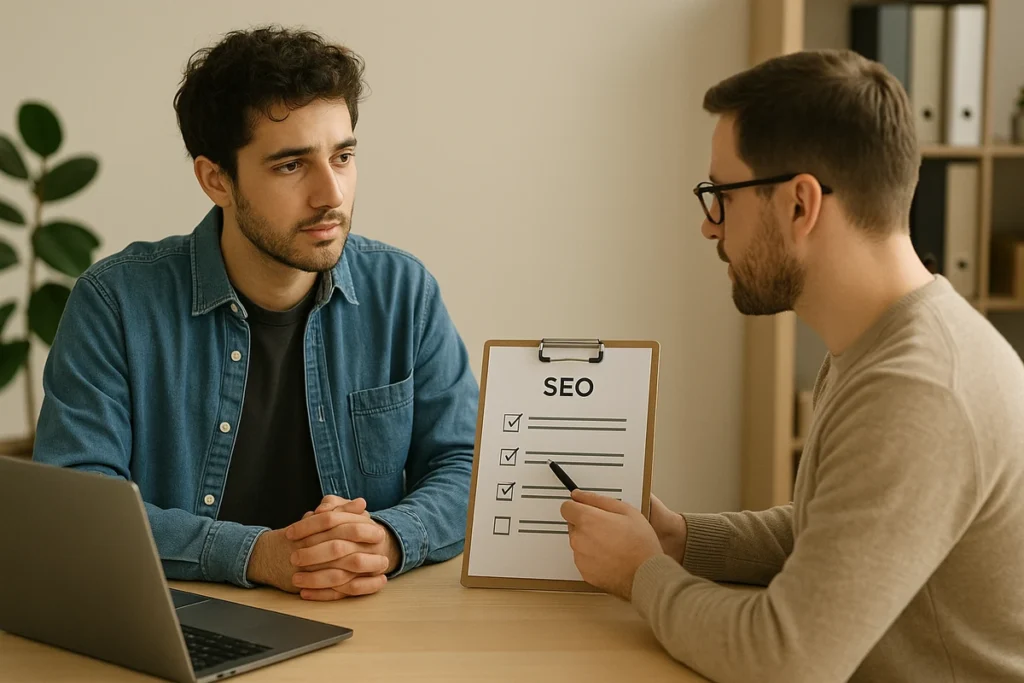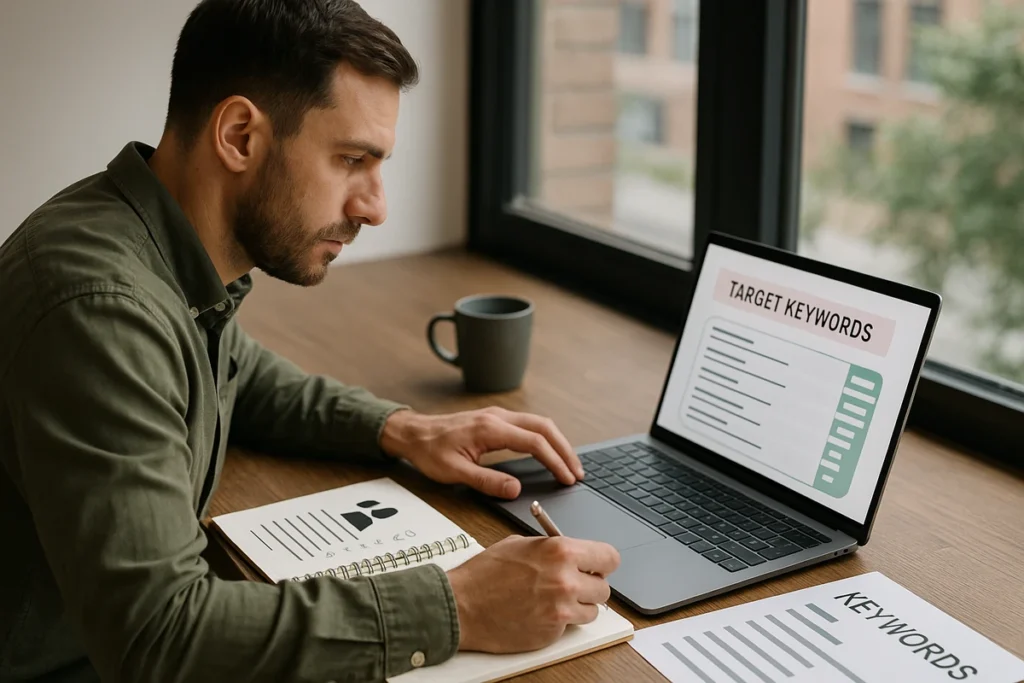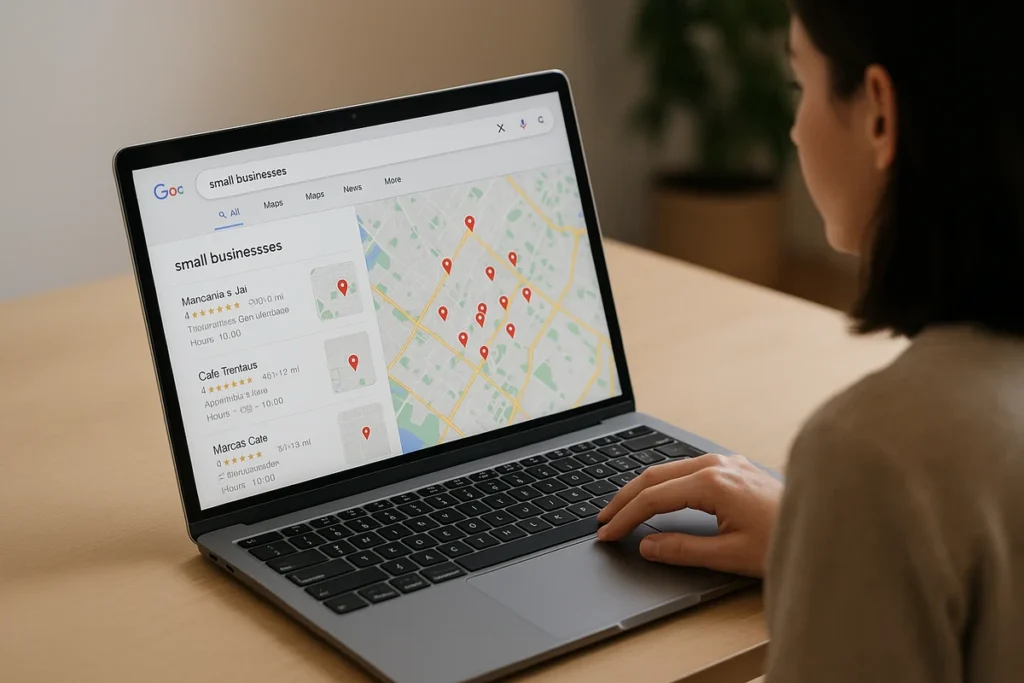If you run a small business, you’ve probably heard that SEO matters. But between juggling customers, managing staff, and keeping the books balanced, looking into search engine optimisation feels like learning another language.
But the truth is, the core principles of SEO basics haven’t changed much over the years, and you don’t need a technical background to get them working for your small business.
And lucky for you, this article covers five fundamental areas that genuinely help customers find you when they search online. Nothing here requires hiring a specialist or spending hours watching tutorials.
Master these foundations, and we promise, your search results will improve steadily over time. Now, let’s start by familiarising ourselves with search engines.
How Search Engines Find and Rank Your Business

When someone types “plumber near me” or “best coffee shop in Brisbane” into Google, something happens in the background that most business owners never think about.
Search engines send out programs called crawlers that constantly scan websites across the internet, which read content and follow links from page to page.
These crawlers collect information about your business (what services you offer, where you’re located, what topics you cover) and search engines store all this in a massive index. So, when someone runs a search query, Google pulls from this index to show the most relevant results.
But what does this mean for your small business? Well, it shows how search engines work best when they can easily understand what your website is about.
For example, a plumbing company that clearly mentions “emergency plumbing repairs” and “blocked drain services” throughout its site gives search engines obvious signals. A bakery that talks about “sourdough bread” and “custom birthday cakes” does the same thing.
Hence, the more clearly you communicate what you do, the better search engines can match your business with people typing related searches.
Now that you know how search engines work behind the scenes, the next step is figuring out which specific words those customers are actually typing in.
Finding the Words Your Customers Use
Now that search engines are looking at your site, what should they find? This is where you’ll learn about keyword research (don’t worry, it’s quite simple).

Don’t stuff your website with random phrases. Follow along as we explain how to narrow down the exact keywords your customers are using to look for your business.
Think Like Your Customer
You might call it “dental restoration work,” but your customers are typing “fix broken tooth” into Google. This gap happens all the time.
We recommend spending a few minutes writing down how a regular person would describe what you do. Ask friends or family what they’d type if they needed your service. Those everyday phrases often have better search volume than the professional terms you use internally.
Check What’s Already Working
Google Search Console is a free tool that shows which search queries already bring people to your site. Look through this list and you’ll spot patterns.
Maybe people find you through “affordable wedding photographer” more than “professional photography services.” That’s valuable data telling you which relevant keywords actually connect with your target audience.
Start Local and Then Expand
If you run a local business, add your suburb or city to your main services. “Electrician Parramatta” gets fewer searches than just “electrician,” but the people who search for it are far more likely to become customers.
Once you’ve nailed down a few target keywords that match how people search, you can start using them naturally throughout your website.
On-page SEO: How to Make Your Website Pages Work Harder
On-page seo sounds technical, but it’s really about making sure each page clearly tells both visitors and search engines what it offers. When done right, your website’s content works harder to attract the right people.
So, read on to learn how to improve what you have (an existing website) without starting from scratch.
Start with your page titles. These appear at the top of browser tabs and in search results. A title like “Services – Home” tells nobody anything. But “Emergency Plumbing Services in Sydney” tells search engines and potential customers exactly what they’ll find.
Your headings matter too. Break up your content with descriptive headings that match what people actually search for. If someone’s looking for “commercial plumbing repairs,” having that exact phrase as a heading helps search engines connect your page to that search.
URL structure is another simple fix. A messy URL like “website.com/page123?id=xyz” doesn’t help anyone. Clean URLs like “website.com/commercial-plumbing” make more sense to everyone. Based on our experience working with small business websites, this small change often improves how search engines categorise your pages.
Last but not least, link your “commercial plumbing” page to your “emergency plumber” page when it makes sense. These connections help visitors find more information and show search engines how your content relates to each other.
Pro tip: Make each page obviously about one main topic, and search engines will have an easier time showing it to the right people.
The Behind-the-Scenes Tech Stuff
We know, “Technical” sounds scary, but these basics are manageable for any business owner. Technical seo covers the stuff happening behind your website that affects how search engines and visitors experience your site.

So, let’s break down three technical aspects you can actually control without needing a computer science degree.
Monitor Your Page Speed
It’s no secret that slow websites frustrate people. If your site takes more than a few seconds to load, visitors leave before they even see what you offer. Search engines notice this too, and often rank faster sites higher.
Test your site speed using Google’s free PageSpeed Insights tool. It’ll show you exactly what’s slowing things down. Usually, it’s oversized images or unnecessary plugins. Through our practical experience, compressing images alone can cut loading time in half.
Ensure a Mobile-Friendly Design
If your site looks broken or cramped on a phone, you’re losing potential customers every day.
There are a few free mobile-friendly tests that check how your site performs on phones. If it fails, this becomes your top priority. Search engines actually prioritise mobile-friendly sites in their rankings too, since that’s how most searches happen now.
Clean Site Structure is a Must
A simple, logical layout helps visitors find what they need and helps search engines understand which pages are the most important.
Keep your important pages within three clicks of your homepage. Use clear categories and don’t create dozens of subcategories that confuse everyone. From our research, sites with straightforward structures consistently perform better in organic search.
Local SEO: How to Get Found in Your Area
Most small businesses serve specific areas, so showing up in local search matters more than ranking nationally. Local seo helps nearby customers find you when they need your services right now.

Want to appear when someone in your suburb searches? Read on.
Claim Your Google Business Profile (It’s Free!)
Your Google Business Profile is the foundation of local search. When someone types “plumber near me” or “cafe in Newtown,” Google pulls information from these profiles to show local businesses.
Set yours up at business.google.com if you haven’t already. Fill in everything, including your address, phone number, business hours, services, and photos. Remember, the more complete your profile, the better chance you have of appearing in local search results.
Get Reviews and Respond to Them
Reviews directly influence how Google ranks local businesses. Ask happy customers to leave reviews on your Google Business Profile. Believe it or not, even a few genuine reviews help you stand out in local search.
Respond to reviews, too, both positive and negative. This shows search engines and potential customers that you’re active and engaged.
Build Local Connections Online
Getting mentioned on other local websites helps too. Local backlinks from community sites, local news outlets, or business directories tell search engines you’re genuinely part of the area.
Join your local chamber of commerce, sponsor a community event, or partner with other local businesses. Relationships like these often lead to website mentions that boost your local seo presence.
Ready to Get Found Online?
SEO basics aren’t mysterious; they’re about making it easier for customers to find you when they search online. You don’t need to master every technical detail or chase every new trend that pops up in the seo industry.
Start with one area from this guide. If you run a local business, begin with your Google Business Profile and local seo. If you’re not sure what people search for, spend an hour on keyword research. Pick the area that feels most manageable and do it properly.
Once you’ve implemented these changes, track your progress monthly using Google Analytics and Google Search Console. Watch your organic traffic numbers and see which search queries bring visitors to your site.
Search engine rankings don’t jump overnight, so check your keyword rankings once a month rather than daily. Even small increases in organic search results mean your seo efforts are working.
Quick tip: Celebrate small wins. If you’re getting 10% more organic search results clicks this month than last month, that’s progress worth acknowledging.
Want help implementing these SEO basics for your business? Visit us at fiddlersconvention.org to learn more about how we can boost your search engine rankings today!
